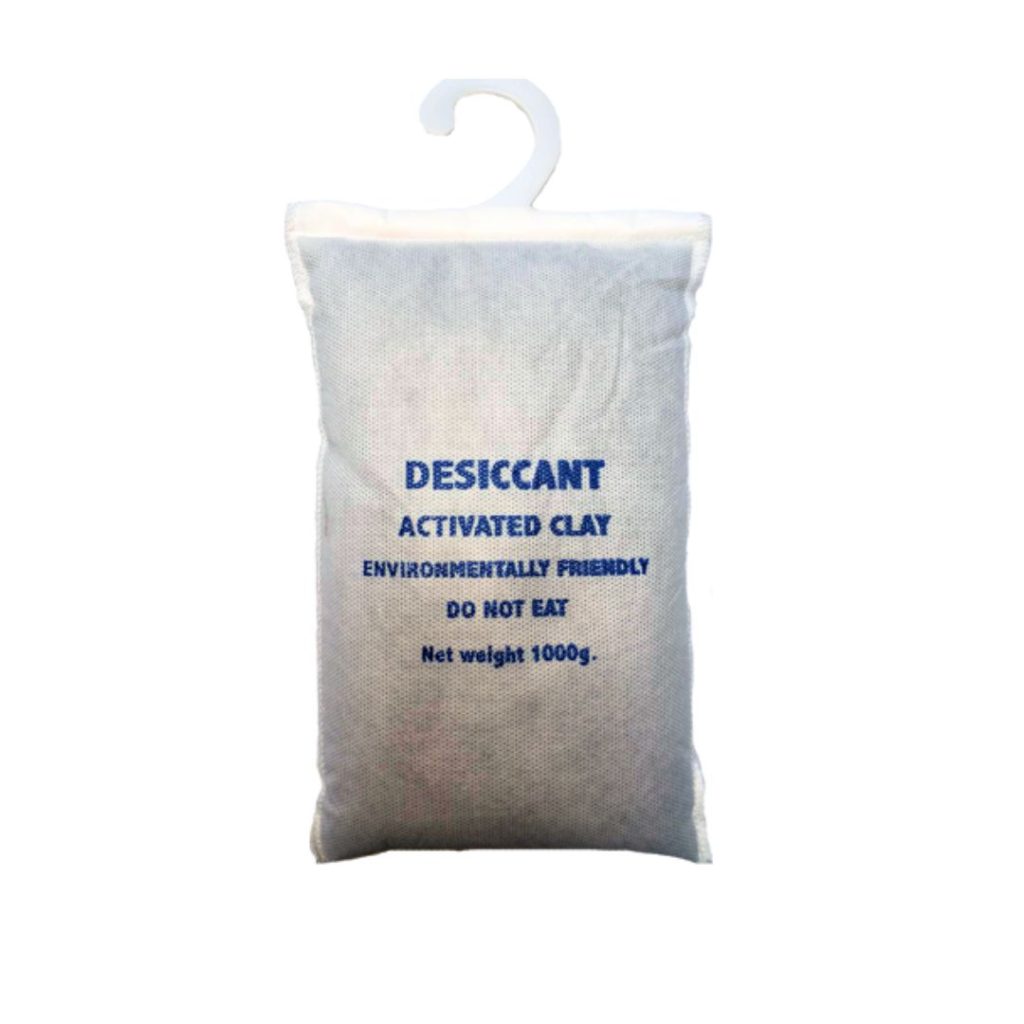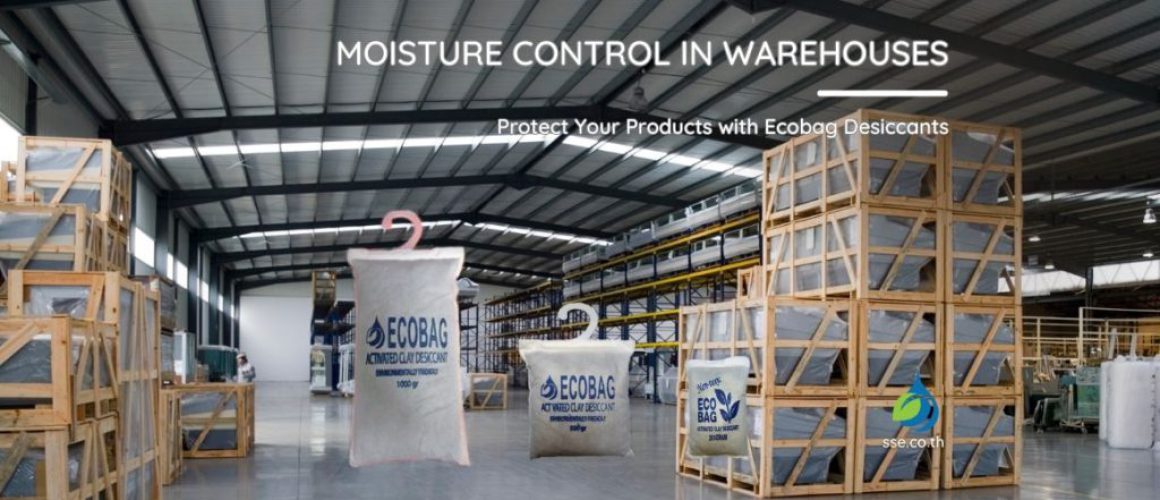Moisture Control in Warehouses: Protect Your Products with Ecobag Desiccants

Table of Content
Moisture Control in Warehouses
Thailand is one of the world’s leading exporters, with a diverse range of products reaching global markets. In 2021, the top 10 export categories included machinery and parts, electrical and electronic equipment, vehicles, rubber products, plastics, precious stones and metals, mineral fuels and oils, fruits and nuts, meat and fish preparations, and organic chemicals. Combined, these categories accounted for more than $185 billion in export value.
Thailand’s primary export categories include machinery, electrical and electronic equipment, vehicles and transportation equipment, rubber and plastic products, food and agricultural products, chemicals, and chemical products. These products represent a significant portion of Thailand’s overall exports, with machinery, electrical and electronic equipment alone accounting for $84.73 billion in 2021. By focusing on moisture control and prevention strategies for these critical product categories, businesses can ensure the preservation of their goods during transportation and storage.
The second largest category, vehicles and transportation equipment, accounted for $31.63 billion in exports in 2021. This category includes car parts, machinery parts, and other related equipment. These products can be susceptible to rust, corrosion, and other damage caused by moisture, making effective moisture control a priority for exporters in this sector.
Food and agricultural products, another key category, generated $23.82 billion in exports in 2021. This sector includes items such as rice, poultry, canned tuna, cassava flour, and shrimp. For these perishable goods, moisture control is crucial in preventing spoilage, mold growth, and maintaining the freshness and quality of the products. Implementing moisture control strategies in storage and transportation can reduce the risk of contamination and ensure the products reach their destination in optimal condition.
Rubber and plastic products, worth $35.16 billion in 2021, are also significant export categories for Thailand. Proper moisture management is essential for maintaining the quality and performance of these materials, as excess moisture can lead to degradation, warping, or discoloration. By implementing moisture control measures, businesses can minimize the risk of product damage and ensure their goods are fit for their intended purpose.
What Causes Moisture Problems in Warehouses?
There are several factors that can contribute to moisture problems in warehouses, including:
- Humidity: High levels of humidity can lead to condensation and dampness, which can damage products and promote mold growth.
- Temperature fluctuations: Changes in temperature can cause condensation, leading to moisture-related issues.
- Poor ventilation: Inadequate airflow can lead to a buildup of moisture, especially in areas with high humidity.
The Importance of Moisture Control in Warehouses
Proper moisture control in warehouses is essential for maintaining the quality of these export products, especially for items that are sensitive to humidity and moisture, such as food, electronics, and machinery. Inadequate moisture control can lead to a host of problems, including mold and mildew growth, corrosion, and damage to packaging, all of which can compromise product quality and safety. Moreover, it can also result in financial losses for businesses and harm their reputation in the global market.
Common Moisture-Related Problems in Warehouses
- Mold and mildew growth: Excess moisture in a warehouse can lead to mold and mildew growth on products and packaging materials, posing health risks and causing unpleasant odors.
- Corrosion: High humidity levels can cause metal parts and machinery to rust or corrode, impacting their functionality and reducing their lifespan.
- Damaged packaging: Moisture can weaken cardboard boxes, labels, and other packaging materials, making them more susceptible to tearing and damage during transport.
- Product spoilage: For food products, improper moisture control can result in spoilage, affecting taste, texture, and safety.
Strategies for Effective Moisture Control in Warehouses
Here are some practical strategies to control moisture levels in your warehouse or storage facility:
- Monitor humidity levels: Regularly check humidity levels using a hygrometer to ensure they are within an acceptable range (typically between 30-60% relative humidity).
- Improve ventilation: Ensure proper airflow by installing ventilation systems and regularly maintaining them.
- Use dehumidifiers: Dehumidifiers can help to maintain a consistent humidity level, preventing moisture-related problems.
- Insulate the warehouse: Proper insulation can help to minimize temperature fluctuations, reducing the risk of condensation.
- Maintain proper storage practices: Store products on raised pallets, maintain adequate spacing between items, and keep a clean and organized warehouse to promote airflow and prevent moisture buildup.
Using Desiccants for Moisture Control in Warehouses
Desiccants, such as silica gel and activated clay, and calcium chloride based container desiccant can play a vital role in moisture control. They are particularly useful for products that are sensitive to moisture, such as electronics, machinery, and certain food items.
Ecobag Desiccants: A Smart Solution for Moisture Control in Warehouses
One of the most effective ways to prevent moisture-related problems in warehouses is by using desiccants, such as Ecobag desiccants. Ecobag desiccants are specifically designed to absorb excess moisture from the surrounding environment, keeping products dry and protected. Made from natural and environmentally friendly materials, Ecobag desiccants are safe to use and can be easily disposed of after use.
Benefits of Using Ecobag Desiccants in Warehouses
- High absorption capacity: Ecobag desiccants can absorb up to 300% of their own weight in moisture, providing excellent protection for a wide range of products.
- Eco-friendly: Made from natural, non-toxic materials, Ecobag desiccants are environmentally friendly and 100% biodegradable.
- Versatile: Ecobag desiccants can be used for a variety of products, including food, electronics, machinery, and more.
- Easy to use: Ecobag desiccants can be easily placed within packaging or storage containers, providing a convenient moisture control solution.
Ecobag natural desiccants are made from activated clay and are an environmentally friendly solution for moisture control. They come in various sizes (200g, 500g, 1kg, and 2kg) and can be placed in storage containers, packaging materials, or directly on pallets to absorb excess moisture.
| Desiccant Size | Usage Example |
|---|---|
| 200g | Small electronic components, food items |
| 500g | Medium-sized machinery, rubber products |
| 1kg | Large equipment, car parts |
| 2kg | Shipping containers, bulk food storage |
By implementing these moisture control strategies and using desiccants like Ecobag natural desiccants, you can protect your products from moisture-related damage and ensure their quality and safety throughout the transportation and storage process.

สุดยอด Ecobag สารดูดความชื้นที่ทำจากดิน เพิ่มประสิทธิภาพในการดูดความชื้น 1,000 กรัม ผ้าไม่ทอ มีตะขอ – 12 ชิ้น สำหรับใช้ในตู้สินค้า
.
Regular Monitoring and Maintenance
To ensure the effectiveness of moisture control measures in a warehouse, it is crucial to regularly monitor temperature and humidity levels. This can be done using various tools, such as hygrometers and temperature sensors. By keeping a close eye on environmental conditions, warehouse managers can quickly identify any potential issues and take appropriate action to address them.
In addition to monitoring, regular maintenance of moisture control equipment, such as air conditioning and dehumidification systems, is essential. This includes cleaning filters, checking for leaks, and ensuring all components are functioning correctly. By staying on top of maintenance, businesses can help prevent system failures and the resulting moisture-related problems.
Training and Awareness
Educating warehouse staff about the importance of moisture control and the potential risks associated with improper moisture management is another critical aspect of ensuring optimal warehouse conditions. This can include providing training on the proper use of moisture control equipment, how to identify signs of moisture-related issues, and the steps to take if a problem is detected.
Frequently Asked Questions About Moisture Control
How do I know if I have a moisture problem in my warehouse?
Some common signs of moisture problems in warehouses include:
– Mold growth or musty odors
– Condensation on walls, ceilings, or windows
– Warped or damaged packaging materials
– Rust or corrosion on metal components
Can moisture control measures help prevent mold growth?
Yes, proper moisture control can help prevent mold growth in warehouses and storage facilities. By maintaining a consistent humidity level (typically between 30-60% relative humidity), improving ventilation, and using moisture-absorbing products like desiccants, you can create an environment that is less conducive to mold growth.
Are there any specific regulations for moisture control in food storage facilities?
Food storage facilities are subject to strict regulations to ensure the safety and quality of stored products. These regulations often include requirements for humidity and temperature control, as well as guidelines for proper storage practices. It’s essential to consult your local food safety authority for specific guidelines and regulations applicable to your facility.
Why is moisture control important in warehouses?
Moisture control is essential in warehouses to maintain product quality, prevent mold and mildew growth, protect packaging materials, and prevent damage to machinery and equipment. Proper moisture control also helps businesses maintain their reputation in the global market.
What is the ideal humidity level for a warehouse?
The ideal humidity level for a warehouse depends on the products being stored. Generally, a relative humidity level between 30% and 50% is recommended for most products, but some items may require specific humidity ranges for optimal storage.
How can I effectively control moisture in my warehouse?
Effective moisture control can be achieved through a combination of proper ventilation, temperature control, humidity control (e.g., using dehumidifiers), moisture-absorbing materials like Ecobag desiccants, and regular monitoring and maintenance of moisture control systems.
What are Ecobag desiccants, and how do they help in moisture control?
Ecobag desiccants are specially designed moisture-absorbing products that help maintain optimal humidity levels in warehouses. They contain a moisture-absorbing agent that absorbs excess moisture from the air, preventing damage to stored products and packaging materials.
How often should I monitor temperature and humidity levels in my warehouse?
Regular monitoring of temperature and humidity levels is crucial for effective moisture control. It is recommended to check these levels daily or even more frequently, depending on the specific requirements of the products being stored.
How can I train my staff to be more aware of moisture control issues in the warehouse?
Provide training on the proper use of moisture control equipment, how to identify signs of moisture-related issues, and the steps to take if a problem is detected. By raising awareness among staff members, businesses can create a proactive culture around moisture control, leading to a more effective approach to managing warehouse conditions.
In Conclusion
Moisture control is an essential aspect of maintaining the quality and safety of products stored in warehouses and storage facilities. By monitoring humidity levels, improving ventilation, using dehumidifiers, and employing desiccants like activated clay, you can effectively manage moisture and safeguard your products from damage.
Do you want to learn more about moisture control solutions for your business? Call us at 085-812 4188 or browse our selection of high-quality moisture control products.
Don’t let moisture problems jeopardize the success of your business. Invest in proper moisture control solutions today to safeguard your products and maintain a reputation for quality and reliability in your industry.
Read more
Ecobag Natural Clay Desiccants
https://sse.co.th/product-categories/activated-clay2
ขอบคุณที่ใช้เวลาอ่านบทความของเราเกี่ยวกับการป้องกันความชื้น ทางเราหวังว่าท่านจะได้รับข้อมูลที่มีคุณค่าและเป็นประโยชน์ ทางเรายินดีให้บริการการปรึกษาฟรีเพื่อพูดคุยเกี่ยวกับความต้องการของท่านและให้คำแนะนำเกี่ยวกับวิธีการป้องกันความชื้นที่กำหนดเฉพาะสำหรับคุณ โปรดติดต่อเราที่ 0858124188 เพื่อนัดหมายการปรึกษาหรือเยี่ยมชมร้านค้าของเราเพื่อค้นหาผลิตภัณฑ์ที่ช่วยป้องกันสินค้าของคุณจากความเสียหายจากความชื้น ทางเราหวังว่าจะได้รับข่าวสารจากท่านเร็วๆนี้
